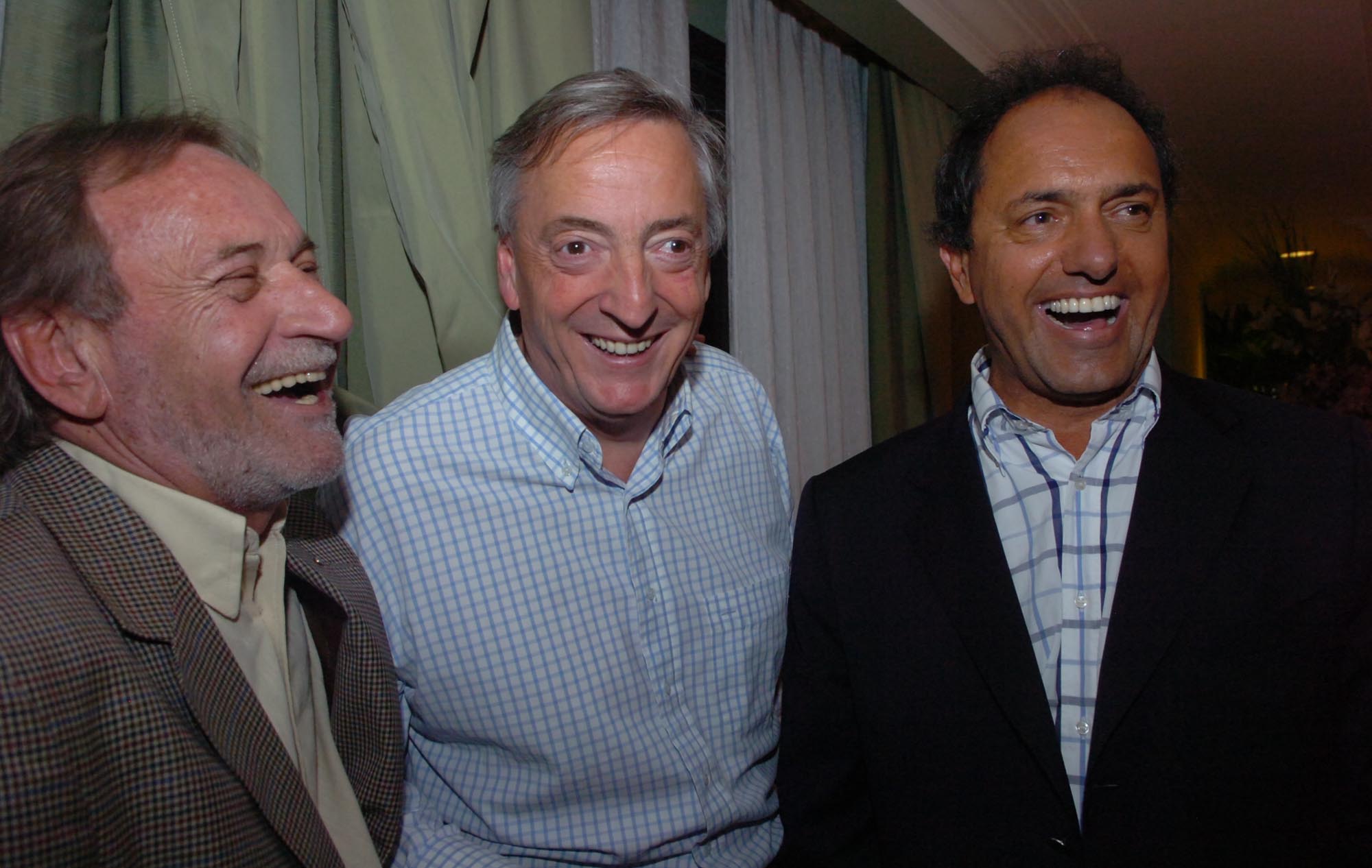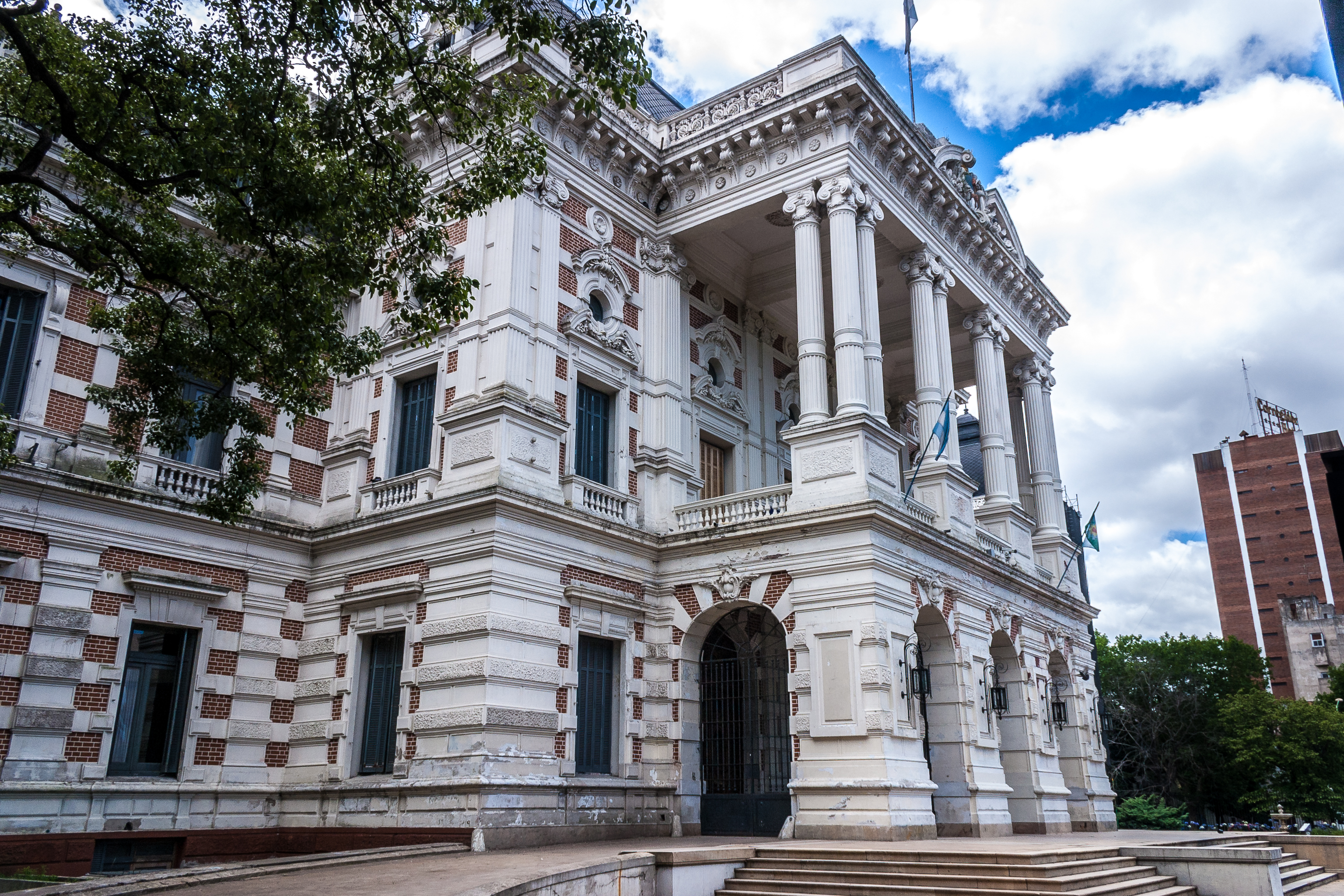|
Santiago Cafiero
Santiago Andrés Cafiero (born 30 August 1979) is an Argentine political scientist and politician, serving as Minister of Foreign Affairs and Worship in the cabinet of President Alberto Fernández since 2021. Previously, from 2019 to 2021, he was Cabinet Chief in Fernández's government. Early life and education Santiago Andrés Cafiero was born on 30 August 1979 in San Isidro, in Buenos Aires Province, son of Juan Pablo Cafiero, who was Minister of Social Development during the presidency of Fernando de la Rúa in 2001, and María Luisa Bianchi. Cafiero's grandfather Antonio Cafiero held many important political posts, including the Governor of Buenos Aires Province, governorship of Buenos Aires, and also briefly served as Chief of the Cabinet of Ministers under Eduardo Camaño. He began his political activism in the :es:Juventud Peronista, Peronist Youth in San Isidro. Cafiero studied political science at the University of Buenos Aires Faculty of Social Sciences, Universit ... [...More Info...] [...Related Items...] OR: [Wikipedia] [Google] [Baidu] |
Ministry Of Foreign Affairs And Worship
The Ministry of Foreign Affairs, International Trade and Worship ( es, Ministerio de Relaciones Exteriores, Comercio Internacional y Culto; MRECIC), informally referred to as the Chancellery ( es, Cancillería), is the Argentine government ministry dealing with the foreign relations of Argentina, Argentina's foreign policy, international development, international trade, diaspora and matters dealing with Mercosur and the Catholic Church. The Ministry of Foreign Affairs is one of the oldest continuously existing portfolios in the Argentine government, having existed uninterruptedly since the formation of the first Argentine executive in 1854, in the presidency of Justo José de Urquiza. The incumbent minister is Santiago Cafiero, who has served since 20 September 2021 in the cabinet of Alberto Fernández. Structure and dependencies The Ministry's Department of Worship (''Secretaría de Culto'') has several directorates. The Registry Directorate maintains the National Register o ... [...More Info...] [...Related Items...] OR: [Wikipedia] [Google] [Baidu] |
Buenos Aires Province
Buenos Aires (), officially the Buenos Aires Province (''Provincia de Buenos Aires'' ), is the largest and most populous Argentine province. It takes its name from the city of Buenos Aires, the capital of the country, which used to be part of the province and the province's capital until it was federalized in 1880. Since then, in spite of bearing the same name, the province does not include Buenos Aires proper, though it does include all other parts of the Greater Buenos Aires metropolitan area. The capital of the province is the city of La Plata, founded in 1882. It is bordered by the provinces of Entre Ríos to the northeast, Santa Fe to the north, Córdoba to the northwest, La Pampa to the west, Río Negro to the south and west and the Autonomous City of Buenos Aires to the northeast. Uruguay is just across the Rio de la Plata to the northeast, and both are on the coast of the Atlantic Ocean to the east. Almost the entire province is part of the Pampas geographical regio ... [...More Info...] [...Related Items...] OR: [Wikipedia] [Google] [Baidu] |
Daniel Scioli
Daniel Osvaldo Scioli (, ; born 13 January 1957) is an Argentine politician, sportsman, and businessman. He was Vice President of Argentina from 2003 to 2007 and Governor of Buenos Aires Province from 2011 to 2015. From 2020 to 2022 he was Argentina's ambassador to Brazil. Since 2022, he has been the country's Minister of Production in the cabinet of Alberto Fernández. He has also served two tenures as president of the Justicialist Party. He was the candidate to the presidency for the Front for Victory ticket in the 2015 general elections, and lost to Mauricio Macri in a runoff election. Family Scioli was born in Villa Crespo, Buenos Aires. He spent his first years in a middle class home located at the corner of Corrientes and Humboldt. His grandfather ran an electrical hardware store, which over time grew into a store selling electrical appliances that was to become the family business. Scioli has described himself as a loyal man devoted to his stable and intimate circle, and ... [...More Info...] [...Related Items...] OR: [Wikipedia] [Google] [Baidu] |
Clarín (Argentine Newspaper)
''Clarín'' (, meaning "Bugle"), is the largest newspaper in Argentina and the second most circulated in the Spanish-speaking world. It was founded by Roberto Noble in 1945, published by the Clarín Group. For many years, its director was Ernestina Herrera de Noble, the founder's wife. ''Clarín'' is part of ''Periódicos Asociados Latinoamericanos'' (Latin American Newspaper Association), an organization of fourteen leading newspapers in South America. History ''Clarín'' was created by Roberto Noble, former minister of the Buenos Aires Province, on 28 August 1945. It was one of the first Argentine newspapers published in tabloid format. It became the highest sold Argentine newspaper in 1965, and the highest sold Spanish-speaking newspaper in 1985. It was also the first Argentine newspaper to sell a magazine with the Sunday edition, since 1967. In 1969, the news were split into several supplements by topic. In 1976, high color printing was benefited by the creation of Artes ... [...More Info...] [...Related Items...] OR: [Wikipedia] [Google] [Baidu] |
Public Policy
Public policy is an institutionalized proposal or a decided set of elements like laws, regulations, guidelines, and actions to solve or address relevant and real-world problems, guided by a conception and often implemented by programs. Public policy can be considered to be the sum of government direct and indirect activities and has been conceptualized in a variety of ways. They are created and/or enacted on behalf of the public typically by a government. Sometimes they are made by nonprofit organisations or are made in co-production with communities or citizens, which can include potential experts, scientists, engineers and stakeholders or scientific data, or sometimes use some of their results. They are typically made by policy-makers affiliated with (in democratic polities) currently elected politicians. Therefore, the "policy process is a complex political process in which there are many actors: elected politicians, political party leaders, pressure groups, civil servants ... [...More Info...] [...Related Items...] OR: [Wikipedia] [Google] [Baidu] |
Faculty Of Social Sciences, University Of Buenos Aires
The Faculty of Social Sciences (''Facultad de Ciencias Sociales''; FSoc), commonly and informally known as Sociales, is the social sciences faculty of the University of Buenos Aires (UBA), the largest university in Argentina. It was founded in 1988, and offers degrees on social work, sociology, labor relations, communication and political science, in addition to a number of post-graduate degrees. The Faculty also counts with two research institutes: the Instituto de Investigaciones Gino Germani (IIGG) and the Instituto de Estudios de América Latina y el Caribe (IEALC), in addition to several research centers and observatories. Among the Faculty's regular publications are the ''Ciencias Sociales'', ''Sociedad'', and ''Sociales en Debate'' journals. As of 2011, it was the fifth-largest faculty in the university by number of students. It is housed in two separate buildings, one located on Marcelo T. de Alvear street, in the Recoleta barrio, and another on Santiago del Estero stree ... [...More Info...] [...Related Items...] OR: [Wikipedia] [Google] [Baidu] |
Political Science
Political science is the scientific study of politics. It is a social science dealing with systems of governance and power, and the analysis of political activities, political thought, political behavior, and associated constitutions and laws. Modern political science can generally be divided into the three subdisciplines of comparative politics, international relations, and political theory. Other notable subdisciplines are public policy and administration, domestic politics and government, political economy, and political methodology. Furthermore, political science is related to, and draws upon, the fields of economics, law, sociology, history, philosophy, human geography, political anthropology, and psychology. Political science is methodologically diverse and appropriates many methods originating in psychology, social research, and political philosophy. Approaches include positivism, interpretivism, rational choice theory, behaviouralism, structuralism, post-struct ... [...More Info...] [...Related Items...] OR: [Wikipedia] [Google] [Baidu] |
El Cronista
''El Cronista'' (''Spanish: The Reporter'') is a daily business newspaper published in Buenos Aires, Argentina. It was founded by Martin Giménez Antonio and first published as ''El Cronista Comercial'' on November 1, 1908. In 1989 the name was changed to ''El Cronista''. It was the first business daily newspaper in Argentina. In 1994, it was the first newspaper in Argentina to publish online. It is published by Unidad Editorial. In 2021, it was acquired by Grupo América for 6 million USD. See also * Communications in Argentina * List of newspapers in Argentina The list of newspapers in Argentina records printed and online newspapers from Argentina. The circulation of newspapers in Argentina peaked in 1983, with a sale of 1,420,417 copies overall. Two decades later it declined to 1,109,441 copies, and t ... References Daily newspapers published in Argentina Spanish-language newspapers Newspapers established in 1908 Mass media in Buenos Aires 1908 establishme ... [...More Info...] [...Related Items...] OR: [Wikipedia] [Google] [Baidu] |
Eduardo Camaño
Eduardo Oscar Camaño (born 17 June 1946) is an Argentine Justicialist Party politician. He was in charge of the executive branch in a caretaker capacity, effectively acting as president, for two days between 31 December 2001, and 1 January 2002. Political career Camaño was Mayor of Quilmes Partido from 1987 to 1991. Until 2007 he sat in the Argentine Chamber of Deputies as a deputy elected in Buenos Aires Province. He served as majority leader of the lower house of the Argentine Congress from 2001, hence bringing him to the position of acting president. He became head of the executive branch because of the resignations of interim President Adolfo Rodríguez Saá and provisional Senate president Ramón Puerta. In recent years he sat in the Federal Peronist block allied to Eduardo Duhalde, largely in opposition to then President Néstor Kirchner. In 2007, Camaño stood again for deputy, this time heading a list of anti-Kirchner Peronists in support of the presidential bid of diss ... [...More Info...] [...Related Items...] OR: [Wikipedia] [Google] [Baidu] |
Governor Of Buenos Aires Province
The Governor of Buenos Aires Province ( es, Gobernador de la Provincia de Buenos Aires) is a citizen of the Buenos Aires Province of Argentina, holding the office of governor for the corresponding period. The governor is elected alongside a vice-governor. Currently the governor of Buenos Aires Province is Axel Kicillof since December 11, 2019. Requirements To be able to be elected governor, the person must be an Argentine citizen and must have been born in Argentina, or be the child of an Argentine citizen if born in a foreign country.Constitución de la Provincia de Buenos Aires - Art- 121 The citizen must also be at least 30 years old, and have at least 5 uninterrupted years of residence in the province if not natural from it. The term lasts 4 years, with the chance ... [...More Info...] [...Related Items...] OR: [Wikipedia] [Google] [Baidu] |
Antonio Cafiero
Antonio Francisco Cafiero (12 September 1922 – 13 October 2014) was an Argentine Justicialist Party politician. Cafiero held a number of important posts throughout his career, including, most notably, the governorship of Buenos Aires Province from 1987 to 1991, the Cabinet Chief's Office under interim president Eduardo Camaño from 2001 to 2002, and a seat in the Senate of the Nation from 1993 to 2005. Early and personal life Cafiero was born in Buenos Aires. He joined Catholic Action in 1938, and enrolled at the University of Buenos Aires, becoming President of the Students' Association. He graduated as an accountant in 1944, and earned a Doctor in Economic Sciences in 1948, teaching in the discipline as a professor from 1952 to 1984. Cafiero became a militant Peronist from the 17 October 1945 mass demonstrations in support of populist leader Juan Perón, and entered public service in 1952 as Minister of Foreign Trade in the latter's administration, serving until 1954. He ma ... [...More Info...] [...Related Items...] OR: [Wikipedia] [Google] [Baidu] |






